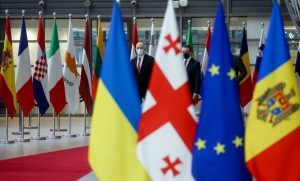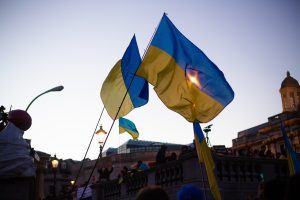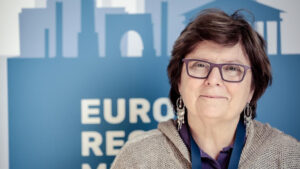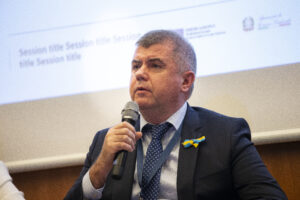Faces of Open Government: Oleksandr Yarema
Rostros del gobierno abierto: Oleksandr Yarema
This publication was produced with the financial support of the European Union. Its contents are the sole responsibility of the Open Government PartnershipThe Open Government Partnership (OGP) is a multi-stakeholder initiative focused on improving government transparency, ensuring opportunities for citizen participation in public matters, and strengthen... More and do not necessarily reflect the views of the European Union.
Meet Oleksandr Yarema, the State Secretary of the Cabinet of Ministers and co-chair of the OGP Coordination Council in Ukraine. We sat down with Oleksandr on the sidelines of the OGP Europe Regional Meeting to learn about his efforts to promote civil society and public participation in decision-making, ensure access to public information, and, more recently, aid the reconstruction efforts in Ukraine. Watch our interview with him.
What makes OGP a relevant platform in your country and in the region today?
Ukraine has been shaping, building, and developing a democratic society for many years. And we see throughout history, particularly the Revolution of Dignity, that it is important for citizens to be active participants in processes at the state level, to participate in the decision-making process, to participate in shaping these decisions, to implement them together with the government, and to monitor their implementation. Therefore, the core ideas, values, and principles embedded in OGP are very relevant. That is why, it is obvious that this platform is important for Ukraine, and we are interested in developing it.
What is your favorite open government success story from your country, and why?
If possible, I will stop at not one, but two. In times of peace, I can’t help but mention Prozorro and Prozorro.Sale. This is a very good example where the government, business, and civil society agreed on the rules, enforced them, and started to implement them successfully. As for the times of the full-scale Russian invasion of Ukraine, our success story is that we agreed with our partners that we would not only continue implementing the current action planAction plans are at the core of a government’s participation in OGP. They are the product of a co-creation process in which government and civil society jointly develop commitments to open governmen... but also start working on the next action plan.
Tell us a little bit about your professional journey, how did you become involved with youthRecognizing that investing in youth means investing in a better future, OGP participating governments are creating meaningful opportunities for youth to participate in government processes. Technical ... More and civic movements?
At school, I did not like some of the processes around me. I realized that it was necessary to come together to change things. Later on, during my university years, I became a civic activist, I joined a youth organization, and then my career consisted of approximately equal shares in civil society, such as youth organizations and think tanks, and also in the government. To me, this combination of experiences was very beneficial: having an understanding of how both civil society and government work. When you have some ideas you want to implement, on the one hand, you need to have the governmental perspective, to ensure the sustainability of your ideas, on the other hand, it is important to have a civil society perspective because it gives you more freedom of action, and the ability to approach any issue more creatively.
What role does OGP play in civil society-government cooperation in Ukraine?
First of all, the vast majority of the commitments implemented within OGP action plans were a result of proposals from civil society – in some plans by 70-90 percent. And here, the government acts as a partner because we understand if civil society institutions speak up about the importance of an issue, obviously it is important for the government to respond. Secondly, the values and ideas of OGP were adopted in various documents developed by the government, not only at the national level but also at the regional level. Recently, Ukrainian municipalities have also joined OGP.
How did your work change after the full-fledged war?
First of all, it gave us more work to do. In addition to the usual format of work, when working on developing policies, implementing, monitoring, and evaluating them, now we have a bigger task: to prevent the spread of aggression, to make the aggressor leave Ukraine, and to win. Therefore, obviously, the amount of work has significantly increased. Speaking about civil society, I won’t exaggerate by saying that this is our secret weapon because the enemy aims to turn us against each other – citizens and the government. In our case, our strength is that we are united, and we see how civil society interacts with business and the government in terms of supporting the army and supporting the integration of people who were forced to leave their homes for a new place. And this is a very important element of synergy when we interact, and obviously, it helps to win the war faster.
Is there a message you’d like to share with the global OGP community?
It is very valuable for us that in these difficult times, in extremely challenging times for Ukraine,
we feel a spirit of partnership from colleagues around the world. It really helps us resist and overcome. Therefore, I want to thank all colleagues from different countries where OGP is represented, for the fact that you think about Ukraine, talk about Ukraine, and for the fact that there are initiatives to support Ukraine. Thank you for this, and we hope that after the victory we will have many opportunities and formats for communication, joint ideas, and initiatives.
Esta publicación fue producida con el apoyo financiero de la Unión Europea. Su contenido es responsabilidad exclusiva de Open Government Partnership y no refleja necesariamente las opiniones de la Unión Europea.
Conoce a Oleksandr Yarema, secretario de estado del Gabinete de Ministros y copresidente del Consejo de Coordinación de OGP en Ucrania. Platicamos con Oleksandr durante el Encuentro Regional de OGP de Europa sobre sus esfuerzos por promover la sociedad civil y la participación pública en la toma de decisiones, asegurar el acceso a la información pública y, más recientemente, ayudar en los esfuerzos de reconstrucción de Ucrania. Aquí puedes ver la entrevista.
¿Por qué OGP es una plataforma relevante en tu país y en la región actualmente?
Desde hace muchos años, Ucrania ha formado, construido y desarrollado una sociedad democrática. A lo largo de la historia, especialmente a través de la Revolución de la Dignidad, hemos visto lo importante que es para la ciudadanía participar activamente en la toma de decisiones, implementarlas junto con el gobierno y monitorear su implementación. Por lo tanto, las ideas centrales, valores y principios de OGP son muy relevantes. Por lo tanto, es obvio que la plataforma es importante para Ucrania y estamos interesados en desarrollarla.
¿En tu país, cuál es tu historia de gobierno abierto favorita y por qué?
Si me lo permiten, mencionaré dos ideas. En tiempos de paz, no puedo evitar mencionar a Prozorro y Prozorro.Sale. Estos son excelentes ejemplos de casos en los que el gobierno, empresas y sociedad civil acordaron una serie de reglas y las comenzaron a implementar de forma exitosa. En los tiempos de la invasión rusa en Ucrania, nuestra historia de éxito es que acordamos con nuestros socios que no solo seguiremos implementando nuestro plan de acción actual, sino que además iniciaremos el desarrollo del siguiente.
Cuéntanos un poco sobre tu historia profesional. ¿Cómo te empezaste a involucrar con la juventud y los movimientos cívicos?
Cuando estaba en la escuela, había algunos procesos que no me gustaban. Me di cuenta que era necesario formar alianzas para cambiar las cosas. Más adelante, en la universidad, me convertí en un artista cívico: me uní a una organización de jóvenes. Mi carrera ha sido en partes iguales en la sociedad civil (por ejemplo organizaciones de jóvenes y laboratorios de ideas) y en el gobierno. Para mí, esta mezcla de experiencias ha sido muy útil, pues me ha permitido entender cómo funciona el gobierno y la sociedad civil. Cuando tienes ideas que quieres implementar, por un lado, necesitas la perspectiva de gobierno para asegurar la sostenibilidad de tus ideas y, por otro, la de la sociedad civil pues te da mayor libertad de acción y creatividad.
¿Qué papel desempeña OGP en la cooperación entre la sociedad civil y el gobierno en Ucrania?
Primero, la gran mayoría de los compromisos implementados como parte de los planes de acción de OGP fueron propuestos por la sociedad civil (en algunos planes entre el 70 y el 90 %). En este caso, el gobierno funge como socio porque entendemos que si la sociedad civil se expresa sobre la importancia de algún tema, es obvio que es importante que el gobierno responda. Segundo, los valores e ideas de OGP se adoptaron a través de varios documentos desarrollados por el gobierno, no solo a nivel nacional, sino también a nivel local. Recientemente algunos municipios ucranianos también se incorporaron a OGP.
¿Cómo ha cambiado tu trabajo después de la guerra?
Primero, la guerra nos ha dado más trabajo. Además del formato normal de trabajo de desarrollar, implementar, monitorear y evaluar políticas, ahora tenemos una tarea más importante: evitar la expansión del agresor, hacer que salga de Ucrania y ganar. Por lo tanto, el trabajo ha aumentado significativamente. En cuanto a la sociedad civil, no exagero al decir que es nuestra arma secreta, pues el enemigo quiere poner en contra a la ciudadanía y el gobierno. En nuestro caso, la fortaleza es que estamos unidos y que la sociedad civil interactúa con las empresas y el gobierno para apoyar al ejército y la integración de las personas que fueron obligadas a dejar sus hogares y buscar un nuevo sitio. Éste es un elemento importante de sinergia cuando interactuamos y, obviamente, nos ayuda a ganar la guerra más rápidamente.
¿Qué mensaje quieres compartir con la comunidad global?
Para nosotros, es muy valioso que en estos tiempos tan difíciles para Ucrania, sentimos un espíritu de alianza por parte de los colegas de todo el mundo. Realmente nos ayuda a resistir y vencer. Por ello, quiero agradecer a todos nuestros colegas de los países en donde se encuentra OGP por pensar en Ucrania y hablar de ella y por las iniciativas que han apoyado a Ucrania. Gracias y esperamos que después de la victoria tengamos muchas oportunidades y formas de comunicación e ideas e iniciativas conjuntas.
No comments yet
Related Content

New EU Hopefuls Need to Ramp Up the Fight Against Corruption
Against the backdrop of the ongoing Russian invasion of Ukraine, the European Council made a historic decision to grant Ukraine and the Republic of Moldova European Union (EU) candidate status.…

Ukraine’s Inspiring Journey in the Open Government Partnership
Take a look at Ukraine’s 10-year journey as a champion in OGP, their progress that has been tragically interrupted by the war, and how reformers continue to live by and…
 Challenges and Solutions
Challenges and Solutions Faces of Open Government: Anabel Cruz
Anabel reflects on her experience working with civil society and Latin America globally, and her vision for the partnership's next decade.


Leave a Reply